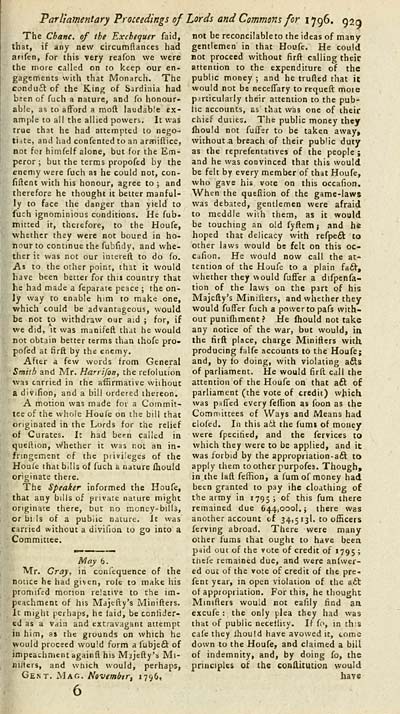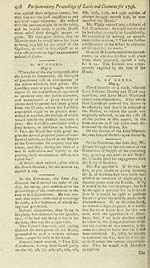Download files
Complete book:
Individual page:
Thumbnail gallery: Grid view | List view

Parliamentary Proceedings of
The Chane. of the Exchequer faid,
that, if any new circumftances had
arifen, for this very reafon we were
the more called on to keep our en-
gagements with that Monarch. The
conducl of the King of Sardinia had
been of fuch a nature, and fo honour-
able, as to afford a mod laudable ex-
ample to all the allied powers. It was
true that he had attempted to nego--
tidte, and had confented to an armiftice,
not for himfelf alone, but for the Em-
peror; but the terms propofed by the
enemy were fuch as he could not, con-
fiflent with his honour, agree to ; and
therefore he thought it better manful-
ly to face the danger than yield to
fuch ignominious conditions. He fub.
mitted it, therefore, to the Houfe,
whether they were not bound in ho-
nour to continue the fubfidy, and whe-
ther it was not our intereft to do fo.
As to the other point, that it would
have been better for this country that
he had made a feparate peace ; the on-
ly way to enable him to make one,
which could be advantageous, would
be not to withdraw our aid ; for, if
we did, It was manifeft that he would
not obtain better terms than ihofe pro-
pofed at firft by the enemy.
After a few words from General
Smith and Mr. Hanifon, the reloiution
was carried in the affirmative without
a divifion, and a bill ordered thereon.
A motion was made for a Commit-
tee of the whole Houfe on the bill that
originated in the Lords for the relief
of Curates. I: had been called in
quelilon. Whether it was not an in-
frmgement of the privileges of the
Houfe ihat bills of fuch a nature fhould
originate there.
The Speaker informed the Houfe,
that any bills of private nature might
originate there, but no ir.oney-bills,
or bi Is of a public nature. It was
carried without a divifion to go into a
Committee.
May 6.
Mr. Cray, in confequence of the
nonce he had given, role to make his
promifid motion relative to the im-
peachment of his Majcfly's Miniflers.
It might perhaps, he laid, be conlider-
ed as a vain and extravagant attempt
in him, as the grounds on which he
would proceed would form a fubjeft of
impeachment againft his Mjjefty's Mi-
niiters, and which would, perhaps,
Gent. Mag. Novembtr, 1796.
Lords and Commons for \*i(^b, ggg
not be reconcilable to the ideas of many
gentlemen in that Houfe. He could
not proceed without firft calling theic
attention to the expenditure of the
public money ; and he trufted that ic
would not be necelTary to requeft mote
particularly their attention to the pub-
lic accounts, as tliat was one of their
chief duties. The public money they
fhould not fuffer to be taken away,
without a breach of their pub'ic duty
as the reprefentatives of the people ;
and he was convinced that this would
be felt by every member of that Houfe,
who gave his vote on this occafion.
When the quefiion of the game-laws
was debated, gentlemen were afraid
to meddle with them, as it would
be touching an old fyftem; and hs
hoped that delicacy with refpeft to
other laws would be felt on this oc-
cafion. He would now call the at-
tention of the Houfe to a plain faft,
whether they would fufFer a difpenfa-
tion of the laws on the part of his
Majcfty's Minifters, and whether they
would fuffer fuch a powertopafs with-
out punifhment? He fhould not take
any notice of the war, but would, ia
the tirft place, charge Minifters with
producing falfe accounts to the Houfe;
and, by lo doing, with violating afts
of parliament. He would firft call the
attention of the Houfe on that aft of
parliament (the vote of credit) which
was paffed every feffion as foon as the
Comndttees of Ways and Means had
clofed. In this ail the fumi of money
were fpecitied, and the fervices to
which they were to be applied, and it
was forbid by the appropriation-aft to
apply them toother purpofes. Though,
in the laft feffion, a ium of money had
been granted to pay ihe cloathing of
the army in 1795; of '^^is fum there
remained due 644,000!. ; there was
another account of 34,513!. to officers
ferving abroad. There were many
other fums that ought to have beea
p^id out of the vote of credit of 1795 ;
iliefe remained due, and were anlwer-
ed out of the vote of credit of the pre-
fent year, in open violation of the aft
of appropriation. For this, bethought
Minifters would not eafily find aa
excufe : the only plea they had was
that of public neceliity. If fo, in th;s
cafe they Ihould have avowed it, tome
down to the Houfe, and claimed a bill
of indemnity, and, by doing fo, the
principles of the conflitution would
have
The Chane. of the Exchequer faid,
that, if any new circumftances had
arifen, for this very reafon we were
the more called on to keep our en-
gagements with that Monarch. The
conducl of the King of Sardinia had
been of fuch a nature, and fo honour-
able, as to afford a mod laudable ex-
ample to all the allied powers. It was
true that he had attempted to nego--
tidte, and had confented to an armiftice,
not for himfelf alone, but for the Em-
peror; but the terms propofed by the
enemy were fuch as he could not, con-
fiflent with his honour, agree to ; and
therefore he thought it better manful-
ly to face the danger than yield to
fuch ignominious conditions. He fub.
mitted it, therefore, to the Houfe,
whether they were not bound in ho-
nour to continue the fubfidy, and whe-
ther it was not our intereft to do fo.
As to the other point, that it would
have been better for this country that
he had made a feparate peace ; the on-
ly way to enable him to make one,
which could be advantageous, would
be not to withdraw our aid ; for, if
we did, It was manifeft that he would
not obtain better terms than ihofe pro-
pofed at firft by the enemy.
After a few words from General
Smith and Mr. Hanifon, the reloiution
was carried in the affirmative without
a divifion, and a bill ordered thereon.
A motion was made for a Commit-
tee of the whole Houfe on the bill that
originated in the Lords for the relief
of Curates. I: had been called in
quelilon. Whether it was not an in-
frmgement of the privileges of the
Houfe ihat bills of fuch a nature fhould
originate there.
The Speaker informed the Houfe,
that any bills of private nature might
originate there, but no ir.oney-bills,
or bi Is of a public nature. It was
carried without a divifion to go into a
Committee.
May 6.
Mr. Cray, in confequence of the
nonce he had given, role to make his
promifid motion relative to the im-
peachment of his Majcfly's Miniflers.
It might perhaps, he laid, be conlider-
ed as a vain and extravagant attempt
in him, as the grounds on which he
would proceed would form a fubjeft of
impeachment againft his Mjjefty's Mi-
niiters, and which would, perhaps,
Gent. Mag. Novembtr, 1796.
Lords and Commons for \*i(^b, ggg
not be reconcilable to the ideas of many
gentlemen in that Houfe. He could
not proceed without firft calling theic
attention to the expenditure of the
public money ; and he trufted that ic
would not be necelTary to requeft mote
particularly their attention to the pub-
lic accounts, as tliat was one of their
chief duties. The public money they
fhould not fuffer to be taken away,
without a breach of their pub'ic duty
as the reprefentatives of the people ;
and he was convinced that this would
be felt by every member of that Houfe,
who gave his vote on this occafion.
When the quefiion of the game-laws
was debated, gentlemen were afraid
to meddle with them, as it would
be touching an old fyftem; and hs
hoped that delicacy with refpeft to
other laws would be felt on this oc-
cafion. He would now call the at-
tention of the Houfe to a plain faft,
whether they would fufFer a difpenfa-
tion of the laws on the part of his
Majcfty's Minifters, and whether they
would fuffer fuch a powertopafs with-
out punifhment? He fhould not take
any notice of the war, but would, ia
the tirft place, charge Minifters with
producing falfe accounts to the Houfe;
and, by lo doing, with violating afts
of parliament. He would firft call the
attention of the Houfe on that aft of
parliament (the vote of credit) which
was paffed every feffion as foon as the
Comndttees of Ways and Means had
clofed. In this ail the fumi of money
were fpecitied, and the fervices to
which they were to be applied, and it
was forbid by the appropriation-aft to
apply them toother purpofes. Though,
in the laft feffion, a ium of money had
been granted to pay ihe cloathing of
the army in 1795; of '^^is fum there
remained due 644,000!. ; there was
another account of 34,513!. to officers
ferving abroad. There were many
other fums that ought to have beea
p^id out of the vote of credit of 1795 ;
iliefe remained due, and were anlwer-
ed out of the vote of credit of the pre-
fent year, in open violation of the aft
of appropriation. For this, bethought
Minifters would not eafily find aa
excufe : the only plea they had was
that of public neceliity. If fo, in th;s
cafe they Ihould have avowed it, tome
down to the Houfe, and claimed a bill
of indemnity, and, by doing fo, the
principles of the conflitution would
have
Set display mode to: Large image | Transcription
Images and transcriptions on this page, including medium image downloads, may be used under the Creative Commons Attribution 4.0 International Licence unless otherwise stated. ![]()
| Early Gaelic Book Collections > Ossian Collection > Gentleman's magazine, and historical chronicle > Volume 66, Part 2 > (413) |
|---|
| Permanent URL | https://digital.nls.uk/79426727 |
|---|
| Description | Selected books from the Ossian Collection of 327 volumes, originally assembled by J. Norman Methven of Perth. Different editions and translations of James MacPherson's epic poem 'Ossian', some with a map of the 'Kingdom of Connor'. Also secondary material relating to Ossianic poetry and the Ossian controversy. |
|---|
| Description | Selected items from five 'Special and Named Printed Collections'. Includes books in Gaelic and other Celtic languages, works about the Gaels, their languages, literature, culture and history. |
|---|

